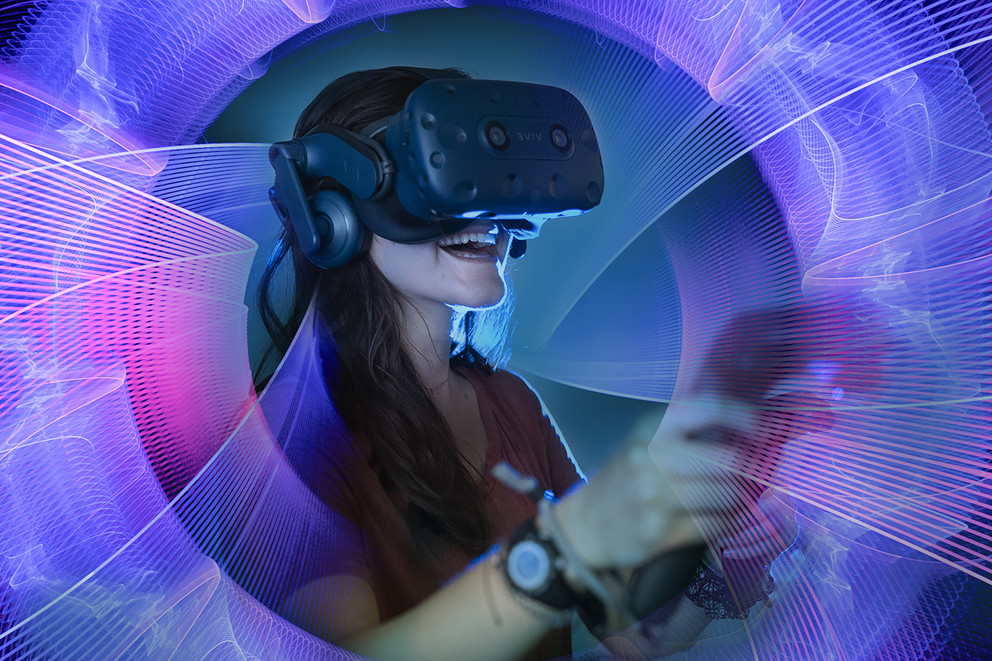
The Center for Immersive Experiences will increase access to virtual reality, augmented reality, 360-degree video, mixed reality and more for Penn State students and faculty. Image: Penn State Image
Center for Immersive Experiences set to debut, serving researchers and students
Posted on October 23, 2019UNIVERSITY PARK, Pa. — Penn State will be equipped to meet the needs of students, faculty, and a society at large that is progressively more reliant on immersive technology with the opening of the Center for Immersive Experiences (CIE) on the University Park campus.
The center, with physical space in Pattee Library and collaborators in 11 different academic units at the University, will feature comprehensive services around teaching, learning and research involving immersive technology by increasing access to virtual reality, augmented reality, 360-degree video, mixed reality and more.
The center — on schedule to open in mid-November — will serve as a conduit for immersive experiences at the University by championing interdepartmental projects; incorporating immersive tech into classrooms; and giving Penn Staters access to a “sandbox” of immersive technologies. The center’s physical space will feature virtual reality bays and a lab that can function as a theater, breakout room or conference space.
Administrators believe Penn State’s collaborative culture, institutional strengths and research focus make it an ideal place to unlock immersive technology’s educational potential.
“Immersive technology continues to grow as an expected part of life for current and future Penn Staters,” said Alex Klippel, professor of geography, Gosnell Senior Faculty Scholar and CIE director. “The center is a joint, University-wide effort that brings together students, faculty and researchers to create a deeper understanding of how this technology influences life as we know it.”
The Center for Immersive Experiences will help the University lead the way in discovering how the technology can provide learning experiences that will benefit students, Klippel said.
Klippel’s work with immersive technology is extensive, and it puts him in a position to provide leadership and guidance regarding the center’s research and programming. Along with developing virtual reality experiences for place-based education, he has published extensive research with support from leading funding organizations about immersive technology’s impact on education, the workforce and research on, for example, climate change communication.
At the center, Klippel leads an executive board comprised of deans from 11 academic programs across the University, and a working group made up of faculty from each of those units. Working group members were appointed by the board and are charged with tailoring the CIE’s strategic plan as it approaches its fall opening.
“The diversity in the units involved highlights the broad potential we all see for immersive technologies,” said Marie Hardin, dean of the Donald P. Bellisario College of Communications, the organizational home of the center. “Alex and others across the University are working to engage these technologies in research and education. The research tells us that they can enhance learning.”
Don Welch, acting vice president for information technology and chief information officer, said the center will encourage leadership and innovation.
“By incorporating immersive practices across Penn State, we are opening doors to experiences beyond traditional learning by expanding opportunities for University-wide collaboration,” he said.
According to a Forbes report, major employers are turning to immersive technology this year. Walmart has implemented VR technology to train and educate its employees, and the U.S. Army is researching AR’s capability to help with mission planning, target acquisition and evaluating soldier performance metrics. As more employers turn to this technology, the need for college graduates to excel with it will only grow.
More information about the center’s offerings, mission and upcoming events may be found at the CIE website.
Klippel is an also a Penn State Institute for CyberScience co-hire.
Share
Related Posts
- Girls, economically disadvantaged less likely to get parental urging to study computers
- IBM Watson featured during recent AI Immersion Series Workshop
- Citizen scientists may be an untapped resource for water quality improvement
- Immersive experiences open up new worlds of teaching, learning and research
